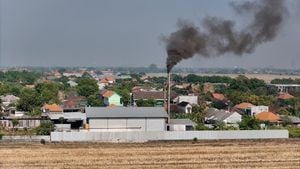Australia's energy and climate conversation has recently been rocked by conflicting narratives involving one of the world’s largest mining companies, Glencore. The company has found itself at the center of controversy following reports claiming it urged the Australian government to slow its transition from coal to renewable energy.
On November 18, The Australian, a prominent newspaper, published a story asserting Glencore's call for the Albanese government to take its foot off the pedal when it came to the shift toward renewable energy sources. The article characterized this suggestion as a significant “intervention” from Gary Nagle, Glencore's CEO. This narrative seemed to paint the mining giant as resistant to change, implying it favored the status quo over proactive climate policies.
But fast forward to Glencore's response, and the story takes a twist. The company issued a statement arguing they did not advocate for slowing down the transition. “Our position is clearly stated: the transition should NOT be slowed down,” the statement emphasized, with capital letters to underline the message. Glencore is recognized not just as a large coal producer but also as Australia's top producer of cobalt, nickel, and zinc, minerals deemed necessary for renewable energy technologies.
The discrepancy caused quite the stir. Glencore asserted its view is aligned with the need for swift movement toward low and zero-carbon energy, albeit with the acknowledgment of the short-term necessity of fossil fuels like coal during the transition phase. This distinction was particularly relevant amid critics arguing for the urgent reduction of coal dependency.
While Glencore maintained its commitment to transitioning, it highlighted the reality of the current energy infrastructure, stating, "Coal would be important, allowing the time and space for an orderly energy transition." The company has closed three Australian coalmines since February 2023, with plans to close three more domestically and four internationally by 2035. This indicates acknowledgment of the need for change, even as it provides for coal use during the transition.
Interestingly, the Australian article sparked additional discussions around the role of coal as a transitional fuel. Critics, including Naomi Hogan from the Australasian Centre for Corporate Responsibility, have vigorously warned against referring to coal as such, labeling it instead as “a fossil fuel in terminal decline.” Hogan pointed to the company's investments—specifically Glencore's continued ventures like the HVO mine project, which aims to extend coal production capabilities—as illuminating the company's apparent contradiction. If coal is truly on the decline, she argued, why would they push for expansions?
Adding to the complexity, Anne-Louise Knight, lead analyst at the Institute for Energy Economics and Financial Analysis, suggested Glencore’s decision not to spin off its coal operations might not signal its commitment to coal but rather provide the company with control over its output and emissions. This may pave the way for managing its coal production responsibly as they seek to reduce overall environmental impact.
This duality of action versus rhetoric raises pertinent questions about the future of energy policy not just within Australia but on the international stage. The global demand for minerals required for renewable technologies grows daily, intensifying the pressure on companies like Glencore to balance their coal interests with the sustainable practices expected by the current political climate.
There’s also the matter of accountability. The Australian’s editor has yet to respond to inquiries concerning the accuracy of their initial claims pointing to Glencore's supposed urge to slow the transition. Though Glencore's statement attempted to clarify their position, it has not quelled the concerns of environmental advocates who continue to watch the energy sector with closely knit brows.
The immediate solution to this misunderstanding remains murky. The tensions between fossil fuel operations and the push for renewables exemplify global struggles around climate action. For many, the terminology surrounding “transitional fuels” adds layers of confusion instead of clarity, complicated by corporate behavior and media representation.
What lies ahead for Glencore and other energy companies is uncertain as they navigate these complex waters of transition alongside government policies and public sentiment. Whether their strategies align genuinely with climate goals or simply serve to maintain their coal revenues will be closely watched.
The clash of narratives around Glencore's position reflects broader issues within Australia's climate strategy and the delicate balance the government must strike between economic interests and environmental responsibility. If the country truly wants to make strides toward renewable energy, it’s imperative for all parties involved to be clear and aligned on the path forward.



